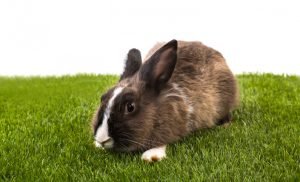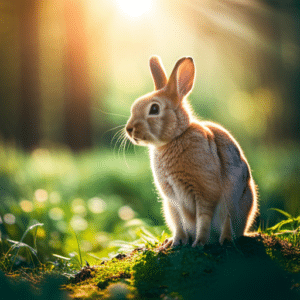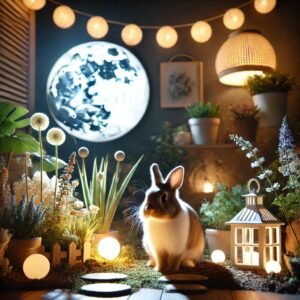Gardening is one of the best activities you can do with your bunny! Not only does gardening provide ample opportunity for mental and physical stimulation but it can also be a great way to help enrich your garden. A popular question that often comes up when discussing rabbits is whether or not their poop is good for gardens. The answer, surprisingly enough, is yes! Rabbit droppings are actually extremely beneficial to plants and soil due to their high nitrogen content. But before you start adding rabbit poops to your gardens, there are some things that you need to know so keep on reading!
Overview of Rabbit Poop and its Benefits for Gardens
Rabbit poop, also known as bunny berries, may not be the prettiest sight in your garden, but it is certainly one of the most beneficial. These small, round droppings are packed with nutrients like nitrogen, phosphorus, and potassium, making them an excellent natural fertilizer for plants. Additionally, rabbit poop is odorless and doesn’t attract flies like other manures, making it a convenient choice for home gardeners. The high nitrogen content helps with plant growth, while the phosphorus helps with root development, and potassium aids in flower and fruit production. So, if you have some bunnies hopping around your yard, don’t be quick to throw out their droppings – it might just be the magic ingredient your garden needs.
How to Identify Rabbit Poop
If you’re spending time outdoors and notice small, round pellets scattered about, it’s possible that you’ve come across rabbit poop! Identifying this type of feces is useful for a number of reasons, such as establishing the presence of rabbits in a certain area or gaining insight into their diet. The pellets themselves are uniform in size and often resemble chocolate-covered raisins. They’re usually found in piles, making them easy to spot, and are a dark brown color. If you’re uncertain whether you’re looking at rabbit poop, horse manure, or another type of animal waste, take a closer look to see if there are any strands of fur present – this can be a telltale sign that it’s from a rabbit. Happy poop-spotting!
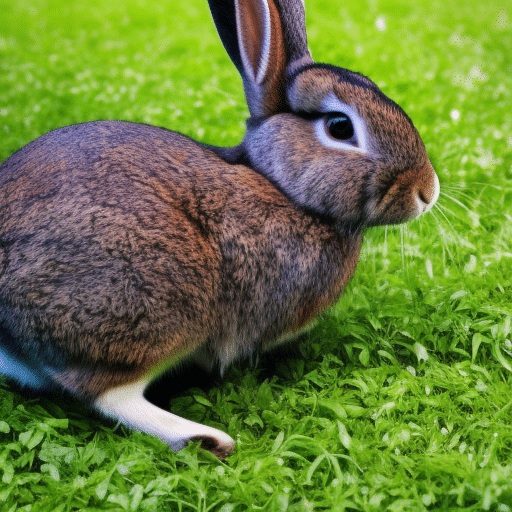
Different Ways to Use Rabbit Poop in the Garden
Gardeners have discovered that rabbit poop is a great fertilizer for their plants. Using rabbit poop in the garden is a natural, cost-effective, and environmentally friendly way to boost soil health and plant growth. Besides being rich in nitrogen, phosphorus, and potassium, rabbit droppings also contain micronutrients that plants need for proper growth. One way to use rabbit poop is to mix it with soil or compost before planting. You can also apply it as a top dressing around plants, or make a liquid fertilizer out of it by steeping the poop in water for a few days. With so many different ways to use rabbit poop in the garden, it’s no wonder that more and more gardeners are turning to this eco-friendly option.
Tips For Properly Gathering and Applying Rabbit Poop
Rabbit poop is a terrific natural fertilizer for home gardeners. It’s packed with nutrients and organic matter that can significantly improve soil quality and boost plant growth. However, gathering and applying rabbit poop must be done properly to ensure maximum benefit for your garden. First, make sure to collect poop that’s at least two months old to avoid any harmful bacteria. Next, let the poop dry and mix it with other organic materials, like leaves or compost, to reduce the concentration of nitrogen. Finally, apply the mixture to the soil around your plants and let nature do the rest. By following these tips for using rabbit manure, you’ll be well on your way to a thriving and healthy garden.
How to Balance the Nutritional Content of Rabbit Poop in Your Garden Soil
Maintaining a healthy and nutrient-rich garden is important for any dedicated gardener. Rabbit poop, also known as rabbit manure fertilizer bunny gold, is a fantastic natural fertilizer that can benefit your garden greatly. However, it’s essential to balance the nutritional content of the poop to ensure that it doesn’t overwhelm your plants. Mixing rabbit poop with other organic materials like garden debris or compost is a great way to balance the nutrient content as it helps to break down the poop and release the nutrients gradually. You can also add other organic fertilizers or supplements to the mix to enrich the soil further. Overall, balancing the nutritional content of rabbit poop in your garden soil is crucial, and once done correctly, it will sustain a healthy garden ecosystem.
Does rabbit poop attract rodents?
Rabbits are adorable and make for cute and fluffy pets. However, their droppings are a cause of concern for many pet owners. The question on many people’s minds is whether rabbit poop attracts rodents. The answer to this is a bit complicated. While rabbit poop does not directly attract rodents, the presence of rabbit urine and feces can create an ideal breeding ground for these unwanted visitors. Rodents are naturally attracted to areas with high moisture and food sources. Rabbit droppings provide both of these, making them a perfect spot for rodents to come for dinner and stay for the long term. It is essential to keep your pet rabbit it’s living areas clean and tidy to prevent the attraction of rodents.
Does rabbit poop attract roaches?
Rabbit owners often wonder whether or not rabbit poop attracts roaches. The answer is not a simple yes or no, as it depends on various factors such as cleanliness and location of the rabbit’s living quarters. While roaches are attracted to food and moisture sources, rabbit feces is not their preferred food source. However, if the area where the rabbit is kept is not cleaned regularly, the buildup of droppings could provide an environment for roaches to thrive. It’s important for rabbit owners to maintain a clean and tidy living space for their furry companion to ensure it stays healthy and roach-free.
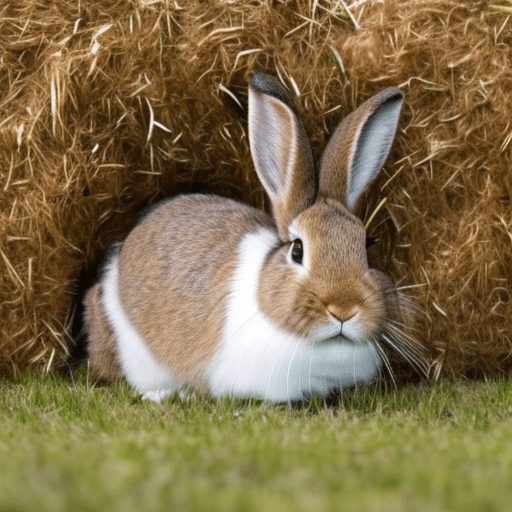
Why are my rabbit poops so big?
If you’re a rabbit owner, you may have found yourself wondering why your furry friend’s poops are so big. Don’t worry, you’re not alone. It’s actually quite normal for rabbits to produce large, fibrous droppings. These pellets are a reflection of their unique digestive system, which relies on producing two different types of feces to extract as much nutrition as possible from their food. While the larger rabbit pellets themselves may not be the most aesthetically pleasing, they are a sign of a healthy, well-fed bunny. So don’t be alarmed by those big poops, they’re just a part of being a rabbit owner!
Does rabbit poop attract bugs?
Rabbit poop may not seem like a big deal, but it can actually attract bugs to your yard or garden. Bugs are naturally drawn to the nitrogen and other nutrients found in animal waste, so if you have rabbits living in your yard or if you use their droppings as fertilizer, you may notice more insects around. This can be problematic if you’re trying to grow vegetables or keep your yard bug-free. However, there are several ways to prevent bugs from being attracted to rabbit poop, such as regularly cleaning up the droppings and using natural bug repellents. By taking a proactive approach, you can help keep your yard looking and feeling great all season long.
Is It Possible to Add Too Much Poop to the Soil?
easily! Too much of any nutrient can be detrimental to plants and soil health. Rabbit poop is incredibly rich in nitrogen, so if you’re adding too much at once, it can lead to a nitrogen overload which can cause a variety of issues including stunted growth and yellowing leaves. It’s best to start small when using rabbit droppings as fertilizer and gradually increase the amount over time to ensure your plants are getting just the right amount of nutrients. Additionally, it’s important to remember that rabbit droppings should not be used as the only source of fertilizer for your garden; a balanced approach with other types of fertilizers is best for a healthy and productive garden!
Is Rabbit Poopco-Friendly?
Yes, rabbit poop can be an eco-friendly fertilizer. Rabbit droppings are high in nitrogen and other essential nutrients like calcium and magnesium, making them a great option for fertilizing plants and soil. In addition to being environmentally friendly, adding some fresh rabbit manure and droppings to your garden or fields is also cost-effective since it’s free-friendly fertilizer and can be sourced from your own backyard. Furthermore, rabbit droppings are not as potent as chemically produced fertilizers, meaning you don’t need to worry about overfertilizing or burning plants with too much nitrogen. So if you’re looking for an organic and eco-friendly way to nourish your garden, rabbit poop is the way to go!
is definitely a great option. Just make sure you’re using it correctly and following all safety precautions to ensure your plants get the proper amount of nutrients without putting you, your family, or the environment at risk. Enjoy fertilizing with rabbit poop responsibly!
Exploring Alternatives if You Don’t Have Access to Rabbit Poop
Rabbit poop can be a highly effective fertilizer for gardens and plants, but not everyone has access to this resource. Fortunately, there are plenty of alternatives that can produce similar results. One option is to use compost made from other types of animal manure, such as cow, horse, or even chicken manure. You can also try using grass clippings, food waste, or even worm castings. Additionally, there are many organic fertilizers available on the market that offer the same benefits as rabbit poop. The key is to find a fertilizer that contains the essential nutrients your plants need and to follow proper application guidelines. With these alternatives, you can still have a thriving garden without relying on rabbit poop.
At The End Of The Day
It is clear that rabbit poop is an excellent choice for providing essential nutrients and minerals to garden soil. With the proper gathering and application techniques, rabbit manure can be a great source of nutrient enrichment in any garden. Furthermore, knowing how to identify rabbit poop can help increase your chances of working with high-quality material. Additionally, it’s important to balance the nutrition ratios of rabbit manure so that your vegetables will grow to their optimal health potential. And just as importantly, you have many alternatives should you not have access to rabbit poo such as using other organic materials like vegetable scraps and other manures. In conclusion, if you decide to use rabbit poop in your garden soil, it can be extremely beneficial; however, learning about proper gathering and application methods will help ensure healthy growth in your plants and vegetables.

